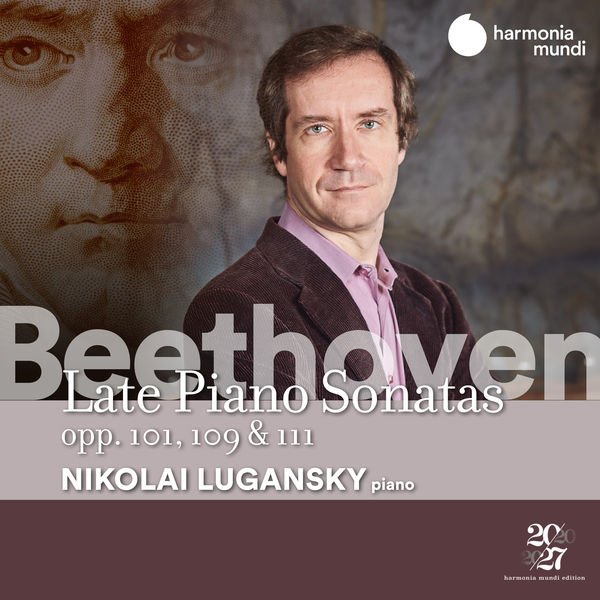
Streaming ilimitado
Escute agora este álbum em alta qualidade nos nossos aplicativos
Iniciar meu período de teste e começar a escutar este álbumCurta este álbum nos aplicativos Qobuz com a sua assinatura
AssinarCurta este álbum nos aplicativos Qobuz com a sua assinatura
Combinations of late Beethoven piano sonatas are common on recordings, never more so than in the Beethoven 250th Anniversary year of 2020. Pianist Nikolai Lugansky here fills a need in the catalog: his is a full-blooded Russian-school reading of late Beethoven. There's much to recommend with Lugansky's readings. He tilts the emphasis toward the finales. Lugansky is especially strong in that of the Piano Sonata No. 28 in A major, Op. 101, where he places the fugue properly among the ecstatic finales of the other late works, whether fugues or not. His big variation sets in the Piano Sonata No. 30 in E major, Op. 109, and Piano Sonata No. 32 in C minor, Op. 111, are percussive and brilliant, with drive and power that brings the right excitement to the music. Lugansky's playing is backed by the ringing sound of his Steinway, especially in the upper registers. It may have too much of an edge for some, but when his playing catches fire, many will be convinced. Harmonia Mundi's sound also works well. Lugansky was recorded in the Great Hall of the Moscow Conservatory; the sessions were moved from a venue in Italy due to the coronavirus outbreak, but that may have worked to Lugansky's advantage. Another strong point is the inclusion of the A major sonata among the late works; the last four sonatas are more commonly the ones included in groupings of late sonatas, but Lugansky captures the ways in which this sonata represented a creative breakthrough. There are readings of these works with more detail, a more poetic quality in the opening and middle movements; Lugansky's approach is straightforward and forward-moving, but when he hits his stride, one has the feeling that Liszt might have played the sonatas this way, and the ride is an exciting one.
© TiVo
Você está escutando amostras.
Escute mais de 100 milhões de músicas com um plano de streaming ilimitado.
Escute esta playlist e mais de 100 milhões de músicas com os nossos planos de streaming ilimitado.
A partir de 8,99€/mês

Piano Sonata No. 28 in A major, Op. 101 (Ludwig van Beethoven)
Ludwig van Beethoven, Composer - Nikolai Lugansky, Piano, MainArtist
2020 harmonia mundi 2020 harmonia mundi
Ludwig van Beethoven, Composer - Nikolai Lugansky, Piano, MainArtist
2020 harmonia mundi 2020 harmonia mundi
Ludwig van Beethoven, Composer - Nikolai Lugansky, Piano, MainArtist
2020 harmonia mundi 2020 harmonia mundi
Ludwig van Beethoven, Composer - Nikolai Lugansky, Piano, MainArtist
2020 harmonia mundi 2020 harmonia mundi
Piano Sonata No. 30 in E major, Op. 109 (Ludwig van Beethoven)
Ludwig van Beethoven, Composer - Nikolai Lugansky, Piano, MainArtist
2020 harmonia mundi 2020 harmonia mundi
Ludwig van Beethoven, Composer - Nikolai Lugansky, Piano, MainArtist
2020 harmonia mundi 2020 harmonia mundi
Ludwig van Beethoven, Composer - Nikolai Lugansky, Piano, MainArtist
2020 harmonia mundi 2020 harmonia mundi
Piano Sonata No. 32 in C minor, Op. 111 (Ludwig van Beethoven)
Ludwig van Beethoven, Composer - Nikolai Lugansky, Piano, MainArtist
2020 harmonia mundi 2020 harmonia mundi
Ludwig van Beethoven, Composer - Nikolai Lugansky, Piano, MainArtist
2020 harmonia mundi 2020 harmonia mundi
Resenha do Álbum
Combinations of late Beethoven piano sonatas are common on recordings, never more so than in the Beethoven 250th Anniversary year of 2020. Pianist Nikolai Lugansky here fills a need in the catalog: his is a full-blooded Russian-school reading of late Beethoven. There's much to recommend with Lugansky's readings. He tilts the emphasis toward the finales. Lugansky is especially strong in that of the Piano Sonata No. 28 in A major, Op. 101, where he places the fugue properly among the ecstatic finales of the other late works, whether fugues or not. His big variation sets in the Piano Sonata No. 30 in E major, Op. 109, and Piano Sonata No. 32 in C minor, Op. 111, are percussive and brilliant, with drive and power that brings the right excitement to the music. Lugansky's playing is backed by the ringing sound of his Steinway, especially in the upper registers. It may have too much of an edge for some, but when his playing catches fire, many will be convinced. Harmonia Mundi's sound also works well. Lugansky was recorded in the Great Hall of the Moscow Conservatory; the sessions were moved from a venue in Italy due to the coronavirus outbreak, but that may have worked to Lugansky's advantage. Another strong point is the inclusion of the A major sonata among the late works; the last four sonatas are more commonly the ones included in groupings of late sonatas, but Lugansky captures the ways in which this sonata represented a creative breakthrough. There are readings of these works with more detail, a more poetic quality in the opening and middle movements; Lugansky's approach is straightforward and forward-moving, but when he hits his stride, one has the feeling that Liszt might have played the sonatas this way, and the ride is an exciting one.
© TiVo
Sobre o álbum
- 1 disco(s) - 9 faixa(s)
- Duração total: 01:09:09
- 1 Folheto digital
- Artistas principais: Nikolai Lugansky
- Compositor: Ludwig van Beethoven
- Gravadora: harmonia mundi
- Género: Clássica
2020 harmonia mundi 2020 harmonia mundi
Melhorar as informações do álbum
